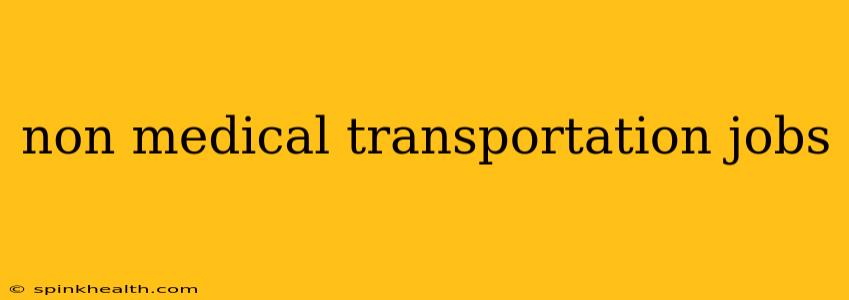Beyond the Stethoscope: Exploring Non-Medical Transportation Jobs
The world of transportation is vast, extending far beyond the realm of ambulances and emergency medical services. Many rewarding and diverse career paths offer the thrill of the road without requiring medical training. Let's explore some exciting options.
What are some non-medical transportation jobs? This is a broad question, and the answer depends on your skills, interests, and desired level of responsibility. From independent contractors to corporate employees, opportunities abound. Let's delve into some specific examples.
1. Driving for Ride-Sharing Services (Uber, Lyft, etc.)
This option offers flexibility and independence. You're your own boss, setting your own hours and working as much or as little as you choose. While it's not a traditional "job" in the sense of a fixed salary and benefits, it offers substantial earning potential, particularly in busy urban areas. Success often hinges on excellent customer service and a deep understanding of your city's layout.
2. Delivery Driver (Food, Packages, etc.)
The rise of e-commerce and food delivery apps has created a huge demand for delivery drivers. Companies like DoorDash, Uber Eats, and Amazon Flex offer part-time or full-time positions, often providing flexible scheduling. This role requires punctuality, navigational skills, and the ability to handle various weather conditions.
3. Truck Driver (Local or Long Haul)
For those who enjoy long drives and the open road, truck driving presents a viable career path. Local trucking often involves shorter routes and daily returns home, while long-haul trucking requires extended periods away from home. A commercial driver's license (CDL) is required, and training is readily available. While demanding, this career can be highly rewarding, both financially and in terms of travel experiences.
4. Chauffeur
This is a more luxurious and specialized area of transportation. Chauffeurs provide transportation services for high-profile individuals or corporations, requiring a professional demeanor, impeccable driving skills, and often a knowledge of local geography and etiquette.
5. School Bus Driver
If you enjoy working with children and have a passion for ensuring their safe transportation, becoming a school bus driver can be very fulfilling. It offers a regular schedule and the satisfaction of contributing to the community. A commercial driver's license (CDL) with appropriate endorsements might be necessary, depending on your location.
6. Taxi or Limousine Driver
These positions require a strong understanding of local streets and a professional attitude towards customers. While competition can be fierce, offering exceptional customer service can set you apart.
7. Transportation Dispatcher
This role involves coordinating transportation services, assigning drivers to routes, and managing schedules. Excellent communication, organizational skills, and computer proficiency are essential for this position.
8. Logistics Coordinator
This is a crucial role in the transportation industry. Logistics coordinators plan and oversee the efficient movement of goods, ensuring timely delivery and cost-effectiveness. Strong analytical and problem-solving skills are crucial.
9. What kind of education or training is required for non-medical transportation jobs?
The educational and training requirements vary considerably across different non-medical transportation jobs. Some, like ride-sharing, require minimal training, while others, such as truck driving or chauffeuring, necessitate specific licenses and certifications (like a CDL). Many roles benefit from strong customer service skills and a clean driving record.
10. What are the job prospects for non-medical transportation jobs?
Job prospects vary based on location, economic conditions, and specific role. The demand for delivery drivers and ride-sharing services continues to grow, while trucking industries face fluctuations. However, the overall transportation sector remains vital, offering a variety of opportunities for those with the right skills and qualifications. Researching the specific sector you're interested in is crucial for understanding future prospects.
This exploration of non-medical transportation jobs only scratches the surface. Many other roles exist, offering diverse paths for individuals seeking rewarding careers in the transportation industry. Remember to research specific requirements and explore training options to find the perfect fit for your skills and aspirations.

